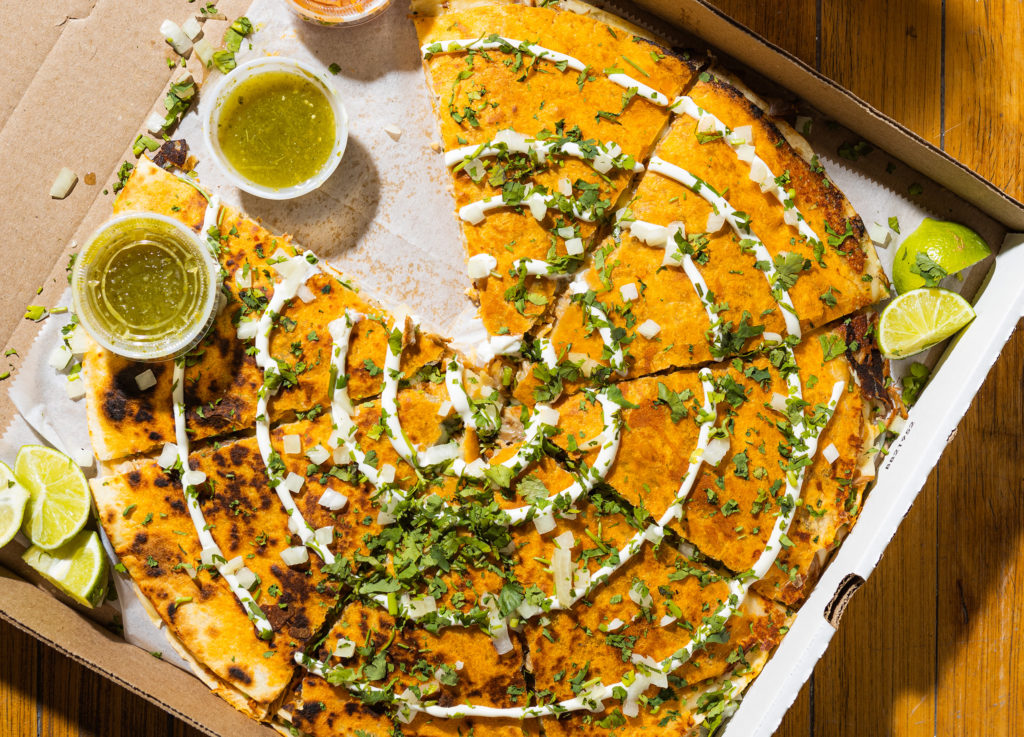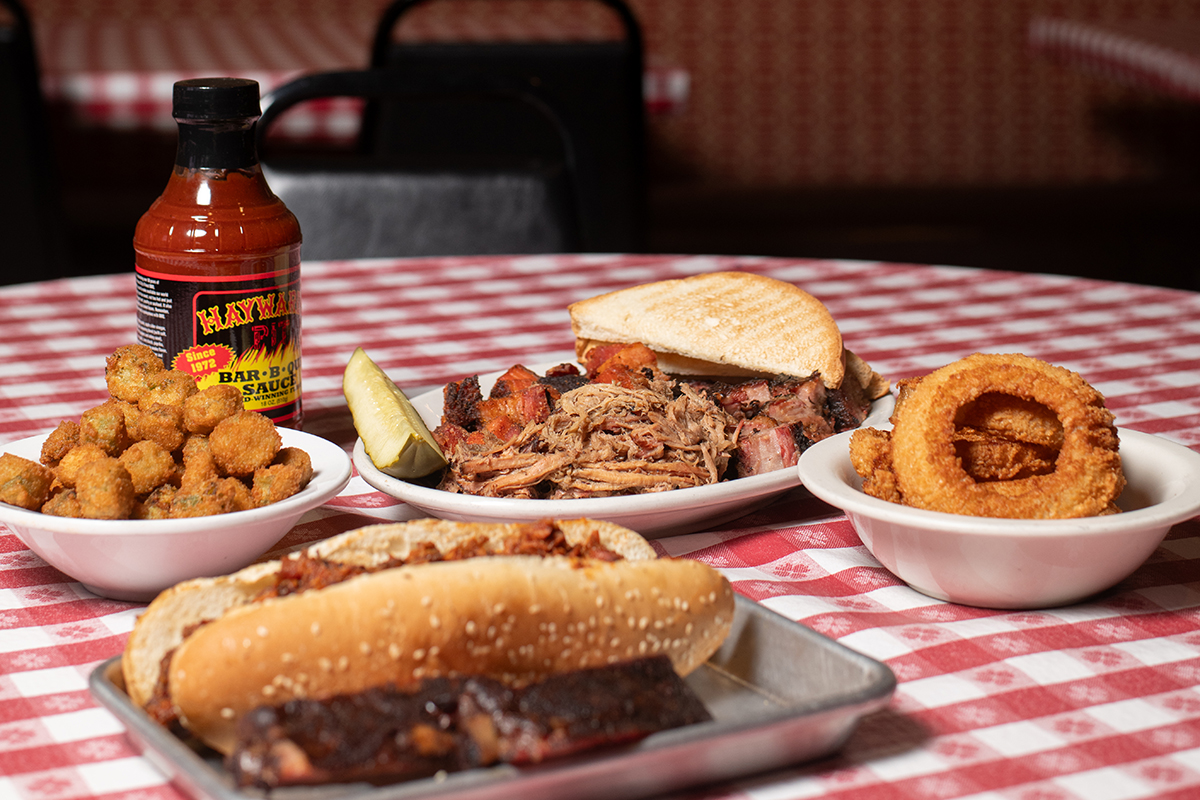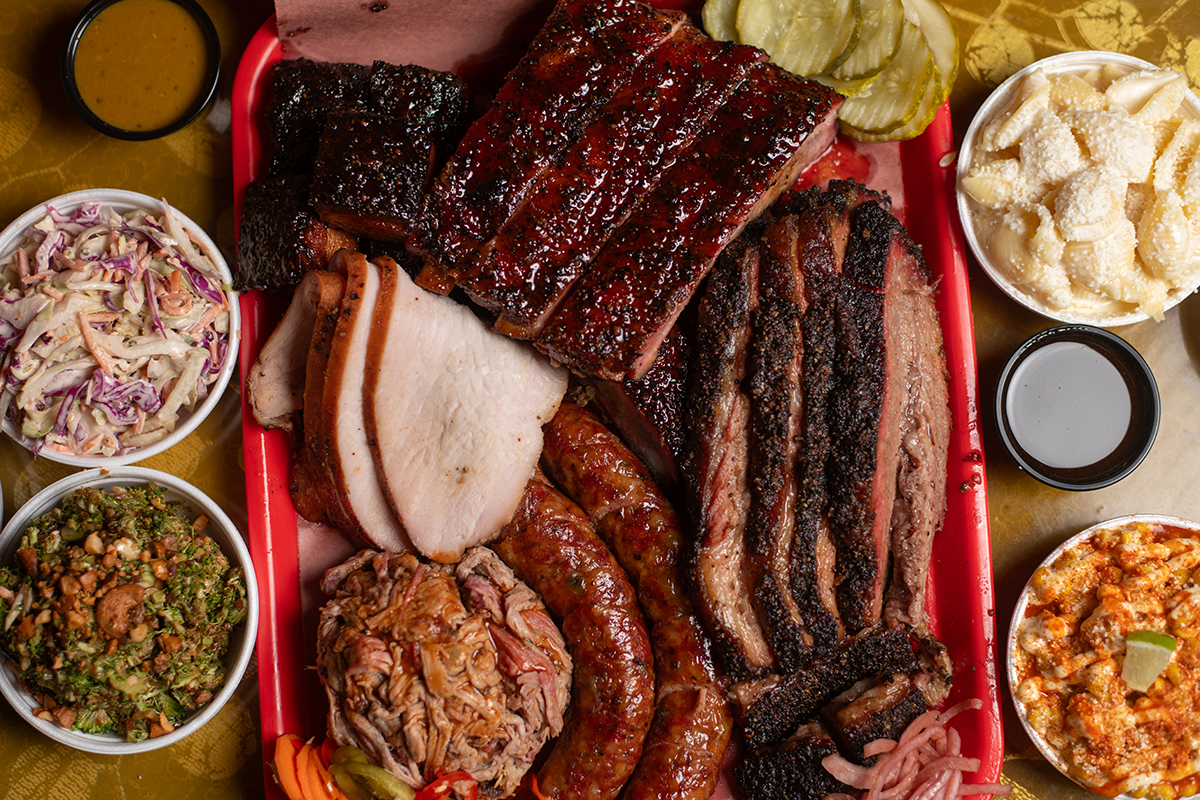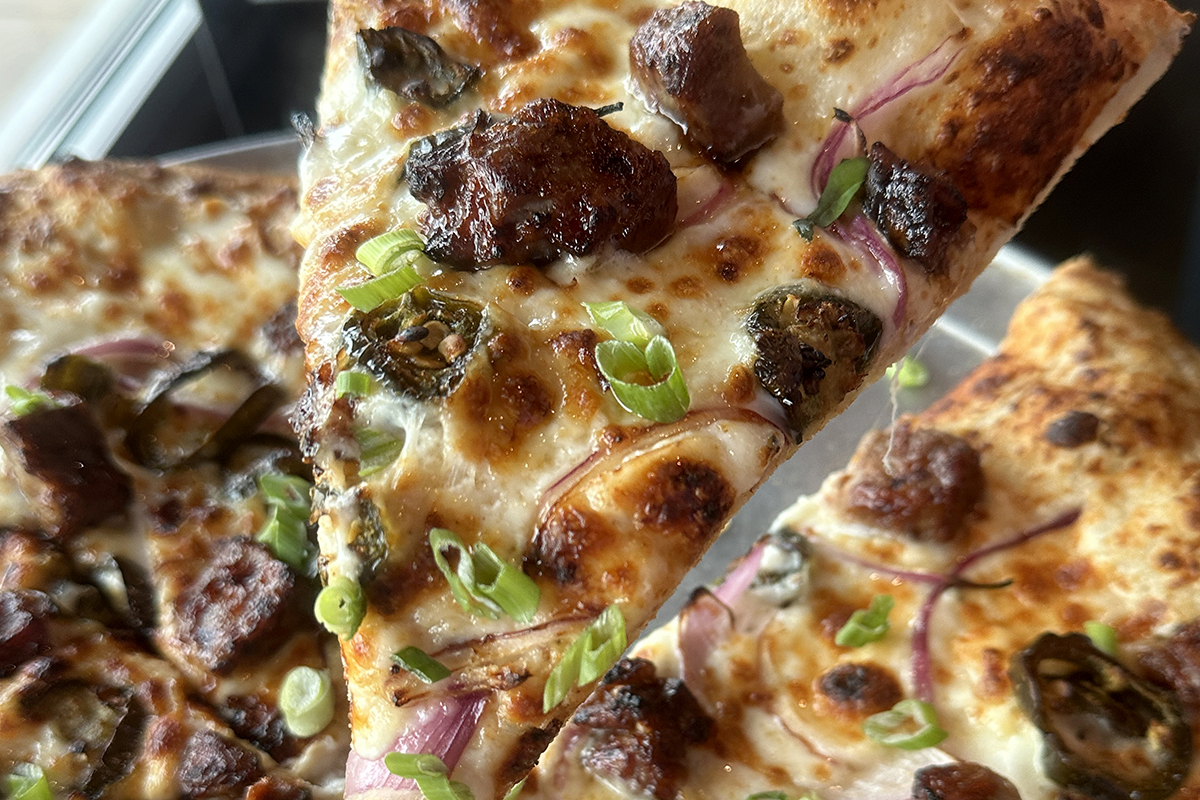You can never tell the secrets a tortilla holds.
I am not referring to what this deceptively plain wrapper carries between its folds: the al pastor licked with heat and pineapple or some impossibly tender cochinita pibil. I mean the hundred thousand mysteries packed and pressed and flattened into the unleavened bread: the ancient process of transforming kernels to masa, the gods and goddesses of maíz revered by the Aztecs, the perseverance of cornstalks that stretch ardently toward a blistering sun. It is so humble, this tortilla, but so profound.
Within the last several years, a new breed of culinarians has emerged, and with them a resurrected idea of what a corn tortilla really is—and what it can be. Meet Kansas City’s third-wave masa evangelists.
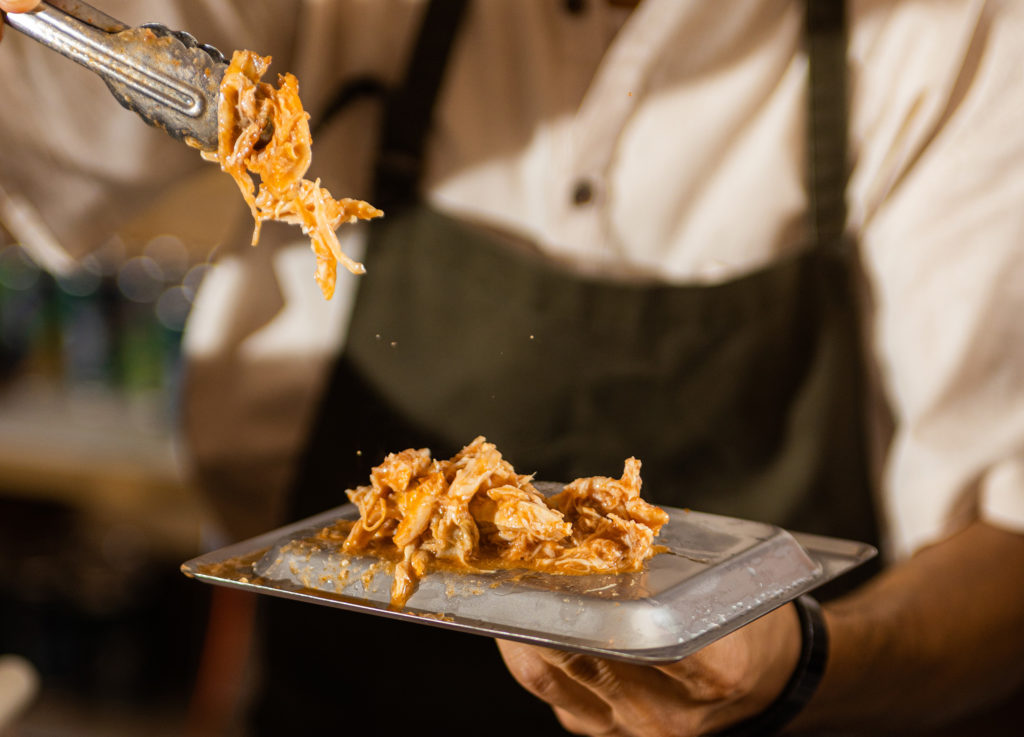
Tacos Valentina
Tacos Valentina sets up three tables under a tent in a parking lot. They don’t have much in the way of equipment—just a portable flat-top grill, two crockpots and a small tortilla press. The menu is small, usually offering no more than five items, and it changes with every pop-up. One week at the Brookside Farmers Market, the feature is a rich mole amarillo con pollo (yellow mole with chicken). On a Thursday at Casual Animal Brewing Co., the fragrant barbacoa is going fast. The recurring vegan option—confit potatoes with strips of fire-kissed nopal and hot salsa macha—might be the best choice you could make.
Each taco is a little gift, painstakingly assembled and finished with a flourish of cilantro. But the hand-pressed tortillas are the backbone of Tacos Valentina’s business.
“We really make masa as the base of our product,” says Roger Avila, one of Tacos Valentina’s three co-founders and partners. (The others are chefs Kendra Valentine and Pablo Muñoz.) “We want to show people another side of Mexican food.”
In 2017, Avila and Valentine moved from Dallas to Kansas City (where they met Muñoz). The plan was always to move on after a couple years, to continue ascending in the industry—until the pandemic hit. Suddenly, there was no time like the present to start their own business.
At the first Tacos Valentina pop-up in August 2021, the three partners made fresh tortillas with masa harina. The end product was good, but Valentine wanted something special, and that meant taking the operation a step further. They found a company called Masienda, which sources single-origin heirloom corn varieties grown by independent farmers in Mexico. They purchased a molino (mill). And then they dug deep into nixtamal.
Nixtamal is the word the Aztecs used for corn they had soaked in water and wood ash. This process would loosen the hull from the kernel, making the corn easier to grind and convert into masa. Today, nixtamal is commonly made by fermenting corn in an alkaline solution of lime and water. And while Mexican megaproducer Maseca’s masa harina is made from nixtamalized corn, the difference is that after it completes fermentation, the masa is dehydrated and pulverized into a fine, dry powder.
“With masa harina, you still have a natural tortilla product,” Avila says, “but the only thing that’s lacking is when you dehydrate the nixtamal, some of the nutrition and flavor from the corn gets lost, and that affects the flavor of the tortilla.”
To make their masa, Tacos Valentina mills the nixtamalized heirloom corn they’ve purchased from Masienda. (Masienda coined the phrase “third wave of masa” to indicate the surging interest in single-origin products and regenerative farming.) The process is quick—just thirteen hours before the masa is ready. Then the team gets to work on the menu.
“We taste the masa, and from there, we decide what it would work best with,” Avila says. “Once we had access to different varieties of corn from different areas in Mexico, it opened up a lot of doors.”
On each menu, Tacos Valentina specifies which corn variety was used and where it came from, and repeat customers learn to look out for the masa they prefer best: The red cónico from EDMX produces an earthy, sweet masa that works well with spices while the bolita velatove from Oaxaca is dense and nutty (Tacos Valentina uses that masa for tetelas, a Oaxacan street food similar to empanadas).
“There is a difference in look and taste from one masa to another, and you can tell right away,” Avila says. “It’s a little like the coffee world when people prefer Brazilian or Ethiopian espresso. We’re helping them with maíz.”
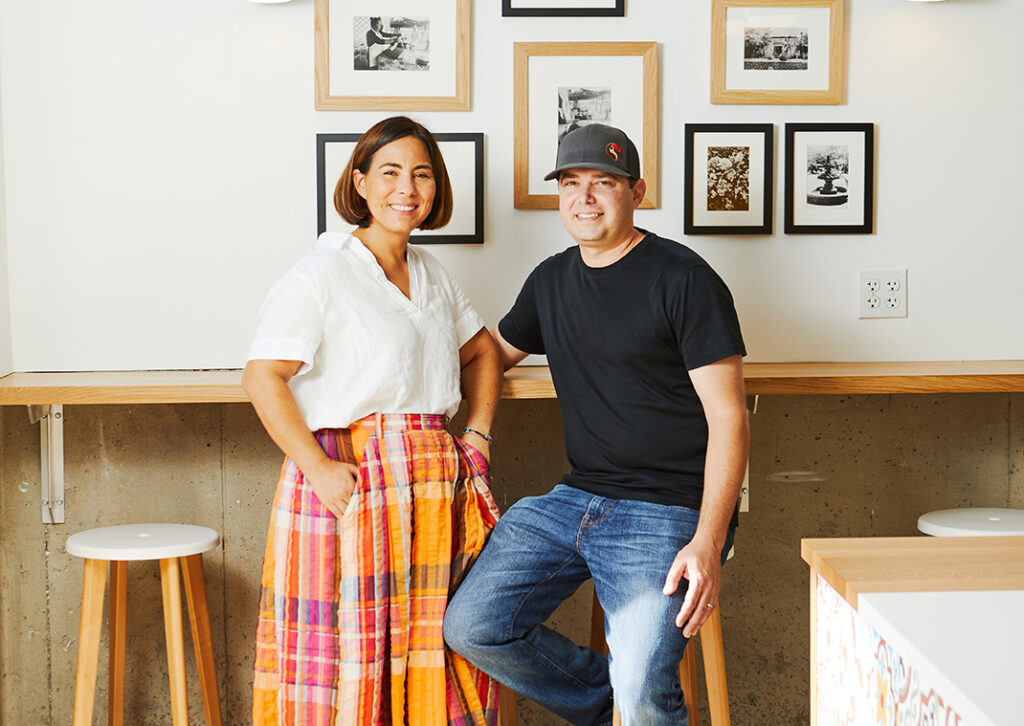
Yoli
“There is no recipe for tortillas,” Marissa Gencarelli says. “There are ratios. It’s a process.”
Marissa is the co-founder and co-owner of Kansas City’s Yoli Tortilleria, which specializes in stone-ground, non-GMO corn tortillas and Sonoran-style flour tortillas. Since launching in 2017, Yoli has grown exponentially, processing up to eight hundred pounds of corn a day. In 2020, Marissa and her husband, Mark, opened a cafe and retail shop in the Westside neighborhood. Today, Yoli is a nationally recognized name in the tortilla game.
When Marissa was first forming the business plan, corn varieties and sourcing were carefully considered.
“We made a list of values, and one of them was sustainability,” Marissa says. “Do we know the farmer? Are we paying a fair price? Are shipping and gas emissions worth the import?”
The Yoli product needed to match its values, she says, and for the business to scale, imported Mexican maíz wasn’t feasible. Nor could Marissa find a way to rent rural Missouri crops and grow proprietary corn. Eventually, she found a fourth-generation farm family in Illinois that grows non-GMO and organic varieties, and today the bulk of Yoli’s corn supply comes from the Midwest. (Mexican heirloom varieties are occasionally brought in and used for limited-edition products.)
“Each corn that we work with has a different purpose,” Marissa explains. With more than seventy-two corn varieties commercially available, she keeps her options open. “Quesabirria was just in vogue, and those tacos need white and yellow corn, but maybe tomorrow the new trend will be something else.”
This past spring, Yoli acquired the KCK-based Art’s Mexican Food Products, a tortilleria and wholesale food company founded in 1961. Art’s is known primarily for their tissue-thin white corn tortilla—the same that many local Mexican restaurants use in their complimentary chip basket. When the owner of Art’s approached Marissa with an offer to sell the company, she saw an opportunity. She says that Art’s operations and products will not change.
Tamaleon
In addition to its signature featherweight tortillas, Art’s sells fresh nixtamalized masa. This is what Crystal Nieves had been using for the tamales in her food truck, Tamaleon, since she started the business in 2020. (Before that, Nieves spent eleven years at Nara.)
“Art’s has a long history in Kansas City, and my mother has been getting masa from them since I can remember,” Nieves says. Her mother was known for her tamales, and this was the inspiration for Nieves’ business. “It’s straight ground corn dough, not powder with water. We take that masa and add our own ingredients to make it taste to our liking.”
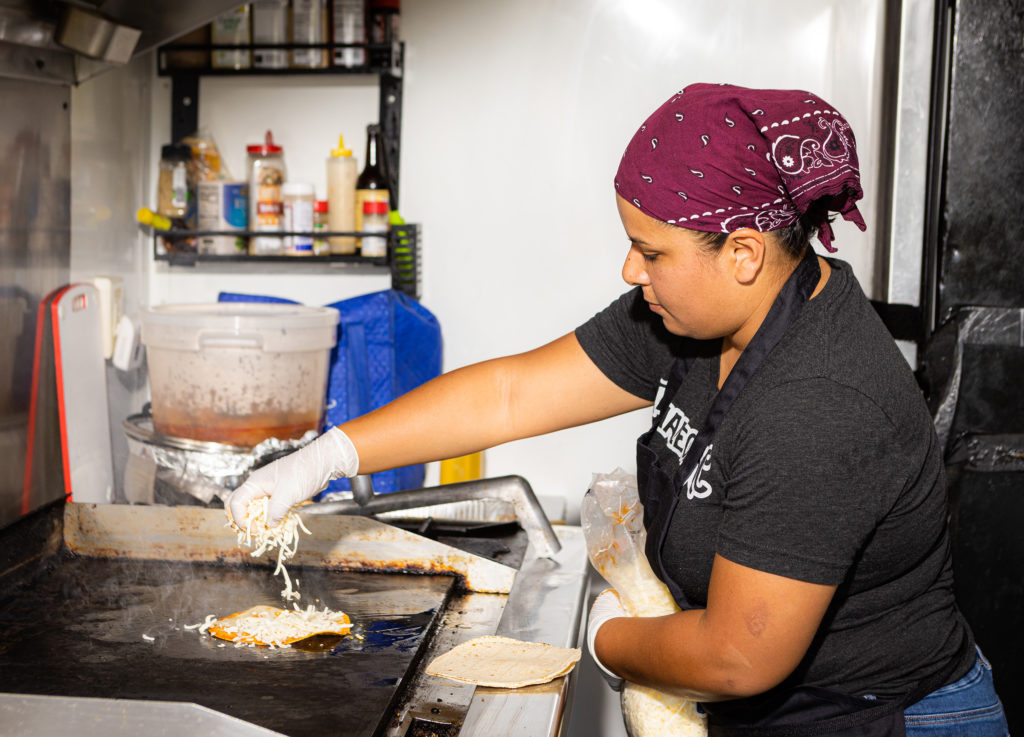
Nieves’ tamales are wonderful, soft and steamy, but the most popular items at Tamaleon are the tacos—particularly the birria. Nieves relies on Art’s for her tortillas, too, but prefers their thick, six-inch corn tortilla.
It’s hard to argue with Nieves when it comes to her birria. Beef is stewed for six hours in a heady broth of chiles—puya, guajillo, ancho—and tomato, and when the meat is trembling in the pot, Nieves calls it done. She spoons out the built-up red film and uses that to grease her tortillas—this is how she crisps up the exterior. The end product is bulging with fiery beef and gooey cheese. It’s less than five dollars, and it is nothing short of glorious.
“I’ve seen restaurants use double tortillas, and I feel like that’s too much,” she says. “You want a tortilla that’s going to give you a good bite but still hold up with the cheese and the broth. Art’s tortillas are perfect.”

